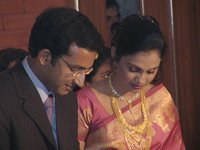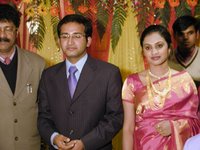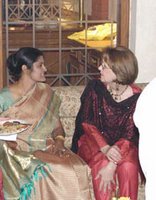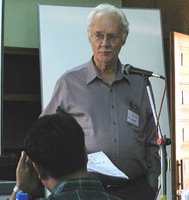 Last week we were invited to attend a wedding reception, which was an interesting cultural experience. The groom is the son of a friend of my wife who is a fellow leader in Bible Study Fellowship here in New Delhi. Some observations about the evening:
Last week we were invited to attend a wedding reception, which was an interesting cultural experience. The groom is the son of a friend of my wife who is a fellow leader in Bible Study Fellowship here in New Delhi. Some observations about the evening:The couple is from Kerala, a state in the south where the wedding took place. It’s tradition that the couple will live in with the grooms parents, who live in Delhi, thus the reason for a reception two weeks after the actual ceremony in the south. It was an arranged marriage, like most marriages in India. I didn’t get a chance to do an in-depth research (I was more interested in the food that was served), but my guess the union was based on three things --- both bride and groom were from Kerala and probably close in caste, both belonging to the same church (Marthoma Syrian, which was supposedly founded by St. Thomas, Apostle of Jesus) and, both being from a middle upper class of society.

As the MC was giving his speech the emphases was on the couples education; the groom has an advanced degree in civil engineering and the bride is completing her M.A. in food technology (whatever the heck that is). One can’t help but be struck by the importance of education in this society. I don’t think I ever attended a wedding in the states where they talked about educational and occupational accomplishments, just memories of the couple when they were little and their character qualities as being sweet, honest or hard working.
After the introduction everyone went by to give their gifts and have their picture taken with the bride and groom. Because it was a Christian wedding of a very strict denomination, there was no alcohol served. The Sikh guy who was there to be the D.J. was told to turn off the Punjabi music, so instead, we listened to the Beatles, Bee Gees, John Denver and Abba. We left early, but I understand the kids danced until about midnight. The food was more South Indian -- dal, rice, dosa and masala chicken. It was a non-veg. affair. Because everyone was from Kerala the women wore sari’s, the men wore western suits and those under 25 wore casual sweaters and jeans. The formal comments and most conversation was in English, though the older folks spoke Malayalam.

Being the only non-Indian couple there, it was obviously a very interesting event for Sandy and me. The mosaic of cultures God has created is amazing to observe.






